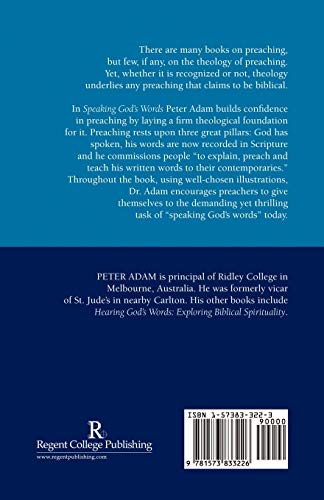



Speaking God's Words: A Practical Theology of Preaching
D**T
A Must for all preachers
I'm striving to become an avid reader everyday. My goal is to read the Bible from cover to cover as well as to read the text that I will be preaching for the upcoming Sunday at least 25 times in addition to also reading through the book the text is found in. I want to become a more biblical, more effective preacher for the glory of God. I have several books on preaching, which I read and reread. One of my many goals as a pastor is to preach the text faithfully, so I also read books on studying the Bible. I just finished a book by Peter Adam called "Speaking God's Words" that I'd like to recommend for those who want to understand the theology of preaching.Adam does an excellent job with explaining the different aspects of preaching. He starts the book off by sharing the importance of having the presupposition that the Bible is God's written Word that God himself speaks to us through. It is with this understanding that every preacher needs to approach the Bible and preaching. If we aren't sure the word that we are preaching is from God, then we don't have the authority to share such truths. Adam emphasizes the importance of the Bible being inspired by God and explains how God used men of old to write his Word to give each preacher the confidence to speak as God's ambassador. He also writes about the importance of understanding that God's Word was written with future generations in mind. Every preacher must keep in mind both the historical and future context when reading, studying and proclaiming God's Word.Adam continues by sharing about the ministry of the Word. He doesn't limit the ministry of the Word to preaching behind the pulpit but extends it throughout the life of the community of faith as well as the individual life of the believer. The ministry of the Word is not limited to preaching. This ministry of the Word calls people to faith, to refute error, to rebuke those who teach error, to encourage the weak, to train disciples, to explain the Scripture, to rebuke sinners, and to summon all people to faith and obedience (47). As you can see, the ministry of the Word goes much deeper than the pulpit. As believers, we should have the Word of God as our foundation and our lens. Everything we do and say should be a reflection of God's thoughts. This is our call to a biblical worldview.Adam continues the second part of the book by focusing on the preacher at work. He defines preaching as the explanation and application of the Word in the assembled congregation of Christ (61). He gives a couple of examples of the past in discussing the ministries of John Calvin and Richard Baxter. Calvin had an unbelievable schedule when it came to the ministry of the Word. He taught through the New Testament every Sunday morning then he ministered to the kids every Sunday evening, usually through catechesis. He preached the Old Testament throughout the week He also taught at a college, the equivalent of what we call seminary today. He planted churches and wrote books and commentaries. His Institution of the Christian Religion grew from his desire to help his congregation understand doctrine, and he wrote commentaries to help give them an understanding of biblical theology. Some of his commentaries actually came directly from his sermons.Richard Baxter on the other hand spent a large amount of his time in one-on-one ministry. He ministered to individuals as well as to whole families. His pulpit ministry wasn't as extensive as Calvin's, but his discipleship ministry was beyond the norm. Baxter would teach the members of his church by visiting them in his home. He wanted to make sure they were genuinely born-again. He wanted them grow in personal holiness.Adam challenges readers to be strong in both pulpit ministry and one-on-one discipleship. Pulpit ministry helps to teach members the truths of the Bible, while one-on-one discipleship helps to promote holiness within the community of faith. I was so inspired and challenged to go beyond the pulpit and to get involved in the lives of the members at Kingdom Living Ministries ([...]). This is a work worthy of all the time I can give to it.Adam continues in this section by sharing the importance of the preacher's Bible. He challenges his readers to preach the content of Scripture as he explains the importance of properly interpreting the text in its original context. He moves from there to the audience of the preacher. Adam emphasizes bridging the gap between the ancient text and a contemporary audience. He talks about knowing your audience and being able to show them the relevance of Scripture in everyday life. I love the fact that he dismantles the ideology that we have to make the Bible relevant. The Bible is already relevant, and we need to help people see the relevance of Scripture. In the minds of many members of today's church, the Bible is a far away reality. The preacher's job is to help the audience see the gospel meeting them right where they live.This book gives wonderful insight into the dual authorship of the Bible. Adam begins by stating that God inspired the Bible but used men to write it. He compares it to the incarnation of Christ. Christ is both divine and human; unless you understand Christ is both, you don't have the real Christ of the Bible. Some people might struggle with the concept of how God moved upon men of old to write his words. God used human words to reveal himself to creation, yet these words are perfect and totally divine. This itself is the working of God alone. Peter explains the importance of understanding biblical theology and how the Bible interprets itself. We should not bring our own philosophies and doctrines to any passage but should extract what God is saying in it. What an important way of properly staying true to God's Word! We cannot handle God's Word unfaithfully. We must have a pure conscience in the sight of God and man (II Corinthians 4).Adam begins to bring conclusion to his book by sharing the preacher's purpose. He states that the purpose of the preacher is to preach what the text is saying and to bridge the gap between his audience and the text. He poses the question that every preacher should ask, "What is God teaching his people in this text?" This is an important question when you want to clearly preach God's Word. He quotes Calvin: "Prophets are (1) outstanding interpreters of Scripture, and (2) men endowed with extraordinary wisdom and aptitude for grasping what the immediate need of the Church is, and speaking the right word to meet it" (143). What an awesome calling for all preachers! We are called to prophesy God's Word to His people. We aren't called to preach anything else but the whole counsel of God's Word.Mr. Adam finishes the book with the demands of preaching. This chapter challenged me as a preacher and made me examine my motives for preaching week after week. He explains the importance of preaching for the love of God and obedience to Christ. This should be the aim of every preacher. We preach because it glorifies God and he commands us. The second demand is a commitment to truth. We must not be afraid to preach truth. Preaching the truth isn't for the sake of truth alone but for bringing the reality of God to his people. In this demand, he refers to John MacArthur, Jr.'s book, "Rediscovering Expository Preaching". MacArthur says that a preacher should not come out of his studies until he understands what God has said and is ready to say, "Thus saith the Lord" on Sunday morning - what an enlightening thought! I may not be paraphrasing MacArthur in a way that does his actual quote justice; just know it made me cry out to God for this type of understanding, heart, and mind. Adam concludes by exhorting preachers to love people by studying God's Word in order to deliver and relay to them what God says in the text.Mr. Adam's book helped me to see the importance of preaching and the demands of it. I was strengthened by reading this book and encourage every preacher, especially pastors, to purchase this book and study it. It will widen your understanding of what every preacher is called to do. God bless you as you stay faithful to the Bible and our Lord.
L**R
Not the easiest read, but worth it
This book is written for those who teach and preach God's Word. It thoroughly expresses that God has spoken, His Words were for His people at the time of writing but also for His future people, and that God commissions people to preach and teach. The second section discusses different ways to minister God's Word to others, practical implications of the Bible's nature and how it affects the way we prepare our sermons and preach, and the preacher's purpose of serving God and Christ, serving the Word of God, and serving the people of God. The final chapter focuses on the demands of preaching: love and obedience to God and Christ, commitment to God's truth, love for people, hard work and time, relating it to the real world, and suffering. Adam reminds us that our sufficiency is from God. This book encouraged me because preaching/teaching is ordained and empowered by God, and His Word is meant to serve God and conform us into His image. It is certainly worth the time to mull over the concepts and understand what Peter Adam is saying.
J**E
No damage
I like book quality
E**N
Seriously helpful
First of all, let's clarify the point that this book is not written by Dick Lucas as the webpage might suggest, it's written by Peter Adam with a foreword by Dick Lucas.Here is a serious book dealing with the historical origins of preaching, an explanation of what constitutes preaching and that, in Christianity, it is God's method for sharing his Word. There are chapters on the preparation of a sermon, the purpose of preaching and the demands it makes of the preacher. There is a wealth of practical instruction and it is carefully cross-referenced to preaching in earlier generations. Perhaps the first three chapters indicate where Adam is coming from: 'God has spoken', 'It is written' and 'Preach the Word'. He believes in the centrality of expository preaching, and that all that we have to say comes from Scripture, faithfully studied, clearly presented and put into its proper context.If you are serious about understanding the craft and the ministry of preaching here is an excellent book to help you. Keep a pencil in your hand for underlining and a notebook nearby.
S**L
Great book.
A great book for people to understand the theology of preaching.
J**A
Four Stars
Worthwhile read
TrustPilot
1 个月前
5天前